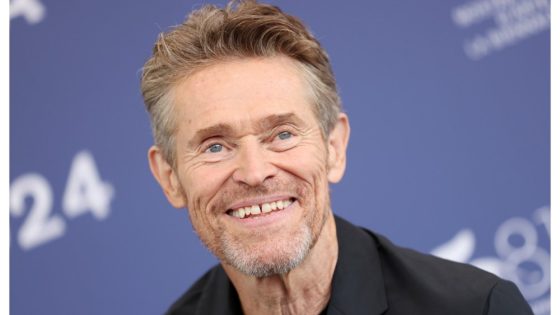Willem Dafoe is at the Venice Film Festival with two hats: he’s among the stars playing in the fest’s opener, Tim Burton’s “Beetlejuice Beetlejuice.” But he’s also busy at work as recently appointed artistic director of the theatre department at the Venice Biennale, the fest’s multidisciplinary parent organization.
Dafoe spoke to Variety about how he’s tackling that challenge.
How did your appointment as artistic director of the Biennale theatre department come about? As I understand it, you got a call from Biennale president Pietrangelo Buttafuoco.
Yes. He asked me if I’d be interested. And then I basically asked what it entailed, and he told me, and I said: “Yes, this would be interesting. It would be a challenge. I will learn something. It’s an honor.” I like the fact that he appreciates my background and recognizes that maybe we could program something interesting.
Did you have any hesitation in accepting, given that Buttafuoco is a member of Italy’s far-right, though he’s known to be a non-conventional person and someone who thinks outside the box?
I knew all of these things. He was also a dear friend of mine, [late great Italian musician] Franco Battiato, and that gave me lots of confidence because Franco was a sweet guy, but he also would not suffer fools. And I got to know Pietrangelo a little bit. So it’s all about: I can separate things out somewhat, and I’m not to judge. I mean, he asks me to do this thing, I asked about the amount of control and freedom, and it seems like he was really interested in having me direct this, so that’s enough. That’s enough. So I’ve heard all those things, and then I measure them against the man and what he proposes, and I say” “Okay, let’s do this.”
What’s your take on the current theatre scene and, more to the point, how would like to contribute to nurturing it?
The truth is, I don’t know what the current theater scene is necessarily. I just know my background and I know what’s important to me about the theater and what sets the theater apart from other art forms. And as an actor, I concentrate on the body and the poetry that can be expressed by the body. So it’s the beauty of that actor in a space and the beauty of an actor doing things. And not always a concentration on narrative, or psychology. It’s okay: it’s total theater, but it’s driven by the actor. And I’m not against technology, but at the same time, I want to go towards the thing that really sets the foundation of what I think is important about the theater and what sets the theater apart from the other forms.
How are you going to do this?
I don’t want to go shopping [for different theatre pieces around the world]. I want to express what my experiences are and contact people whom I’ve worked with. People that are important to me; people that have influenced me; and people that I’m interested in, with the knowledge or experience that I have. The beautiful thing is when you have a connection with people, you don’t just go shopping and slot things in. You’re able to talk to them and say: “This is the space. This is what we can do. These are the terms. Can you make something for me with these kinds of thoughts?” And hallelujah, a lot of the people I’ve contacted – in fact, pretty much all of them, have responded. And they are responding by making new works or doing some revisit of work that they did in the past
Can you mention any names?
Not yet, because it just wouldn’t be fair. We are still in the [selection] process. We have a pretty good lineup so far. But I need to see if everybody’s in agreement with the pieces that are being made specifically, or pieces that are being revamped, or actually laboratory exercises.
Are you going to perform?
I may do some kind of performance, probably quite a modest one. And I may teach some sort of master class or work with developing a group of actors that we continue with.
Having the body at the center of all of this, for you personally, is it also connected to your love for yoga?
Sure. I think so. In fact, I thought about maybe having my yoga teacher come and give a talk about the effect of certain physical things on the brain. We aren’t there yet, first things first. But sure.
This interview has been edited and condensed for clarity.
Source Agencies


